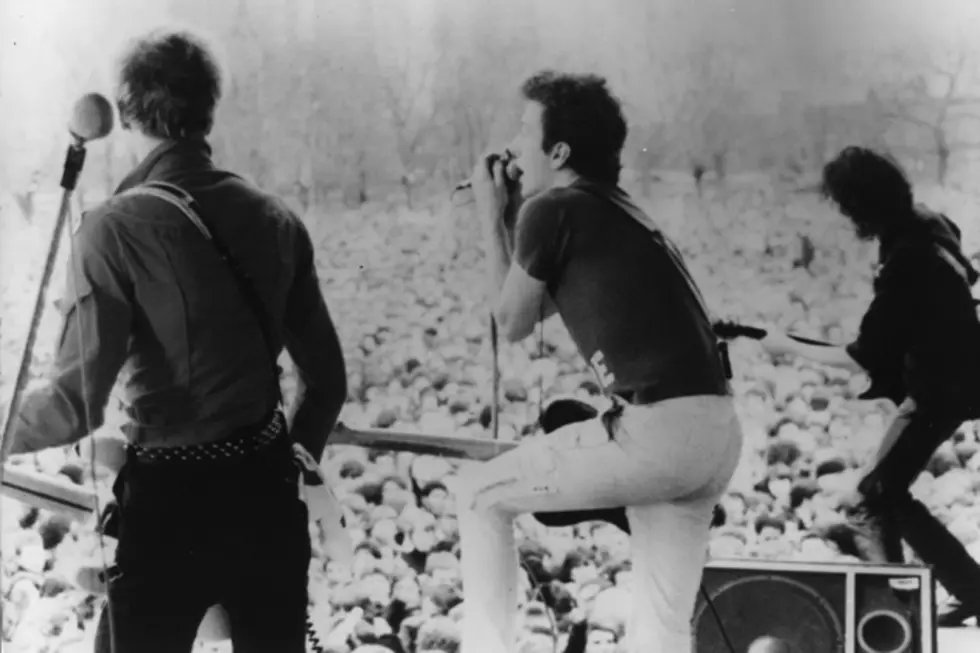
10 Things You Didn’t Know About the Clash
The Clash don't have very many casual fans. The legendary London punk foursome was once described as the "only band that matters," and for legions of rock 'n' roll connoisseurs the world over, that remains true, even after all these years. Given the nature of their rabid following, this list of 10 Things You Didn't Know About the Clash may only shock and amaze newcomers -- those who dig 'Rock the Casbah' but haven't yet jumped down the rabbit hole, devoured the full discography and engaged in geeky debates regarding side six of 'Sandinsita!' (underrated) and the relative merits of Mick Jones' original 'Combat Rock' mix (not as good as Glyn Johns'). Read on to test your Clash knowledge -- then scroll to the very bottom and enter to win the brand-new 'Sound System' box set, a 12-disc collection sure to get diehards drooling.
- Chris Moorhouse, Hulton Archive
Chris Moorhouse, Hulton Archive There was only one constant member, and it wasn't who you think
Clash founders Mick Jones and Paul Simonon were proverbial garage dwellers before they spotted Joe Strummer performing with London pub-rock aces the 101ers and asked him to join up. With Joe at the helm, the group cycled through countless drummers before nabbing Topper Headon in '77, cementing the "classic lineup." That quartet splintered in '82, when a heroin-addicted Headon got the boot, and a year later, Jones, too, was given his walking papers. When the Clash finally hung up their camo trousers in '86, Simo was the only one who'd been there since day one.
- Matthew Peyton, Getty Images
Matthew Peyton, Getty Images They shared a member with Culture Club
Like many a rock 'n' roll band before them, the Clash struggled to find the right drummer, and among those who briefly occupied the throne was Jon Moss, later of Culture Club fame. Moss had said his personality didn't jibe with the rest of the gang, suggesting that as far as divas are concerned, Boy George has nothing on Mick Jones.
- Jo Hale, Getty Images
Jo Hale, Getty Images Chrissie Hynde gave 'Train in Vain' a boost
When Mick Jones recorded the vocals for 'Train In Vain,' literally a last-minute addition to 1979's 'London Calling,' he was looking up through the studio window at Pretenders frontwoman Chrissie Hynde, a longtime friend and fixture of the London punk scene. Jones insists the song isn't about her, but her presence may have inspired his vitriolic performance.
- Rhino
Rhino Paul Simonon doesn't play the Clash's coolest bass line
When the band started work on 1980's 'Sandinista!' Paul Simonon was busy shooting the film 'Ladies and Gentleman, the Fabulous Stains.' He was temporarily replaced by Norman Watt-Roy of Ian Dury and Blockheads, and while Simo eventually turned up for the New York City sessions, Watt-Roy's playing can be heard on 'Lightning Strikes (Not Once But Twice)' and 'Magnificent Seven,' which boasts arguably the Clash's most memorable bass line.
- CBS
CBS 'Rock the Casbah' is virtually all Topper
The Clash's highest-charting U.S. single, 1982's 'Rock the Casbah,' grew from a piano riff Topper Headon had been fiddling with for some time. When he found himself alone one day in the studio, he decided to lay it down, but the multi-talented timekeeper didn't stop there. He added bass and guitar, laying the groundwork for Strummer's rant about Middle Eastern religious fanaticism and the dangers of censorship.
- CBS
CBS Strummer and Jones collaborated after the breakup
Following his dismissal from the Clash, Jones founded Big Audio Dynamite, aka BAD, and in 1986, Strummer co-produced and co-wrote five songs for the group's sophomore effort, 'No. 10 Upping Street.' Prior to that, Mick played on Joe's contributions to the 'Sid and Nancy' film soundtrack, though his guitar was practically stripped from the final mix.
- Fox Photos, Hulton Archive
Fox Photos, Hulton Archive 'London Calling' wasn't actually the best album of the '80s
When Rolling Stone dubbed 'London Calling' the "best album of the '80s," few could argue with their choice, at least from an artistic standpoint. The two-disc set represents the Clash at their absolute peak, but as hardcore fans know, it dropped in the U.K. on Dec. 14, 1979. True, it didn't arrive in America until 1980, but as the Clash would have told you, America isn't the world.
- Hulton Archive
Hulton Archive Poets dug 'em
Jacob Dylan has said in interviews that papa Bob was a fan of the band, and when the elder Dylan cut his '88 album 'Down In the Groove,' he tapped Paul Simonon to play bass. As he reveals in his memoir, 'Chronicles,' he also thought of asking Mick Jones to join him in New Orleans to help record what would become 1989's 'Oh Mercy.' While Dylan never rocked with the Clash proper, fellow wordsmith Alllen Ginsberg did. The revered Beat poet can be heard on 'Ghetto Defendant,' a haunting dope-sick dub cut from 'Combat Rock.'
- Chung Sung-Jun, Getty Images
Chung Sung-Jun, Getty Images Clash hits have strange second lives
The Clash scored their one and only chart-topping U.K. single in 1991, after Levi's used 'Should I Stay Or Should I Go' in a jeans commercial -- or advert, as the Brits say. That same year, Armed Forces Radio picked 'Rock the Casbah' to kick off Operation Desert Storm, and Strummer later said it made him cry to see the tune's title scrawled on bombs that would later fall on Baghdad.
- Evan Agostini, Getty Images
Evan Agostini, Getty Images They almost reunited
After years of turning down big-money reunion offers, the Clash nearly got back together for their Rock and Roll Hall of Fame induction in 2003. Strummer, Jones and Headon were reportedly on board, but Simonon was reluctant. Strummer's death in December 2002 made the stalemate moot, and fans were deprived the thrill (or perhaps saved the embarrassment) of seeing the last gang in town rumble one last time.
More From Diffuser.fm









